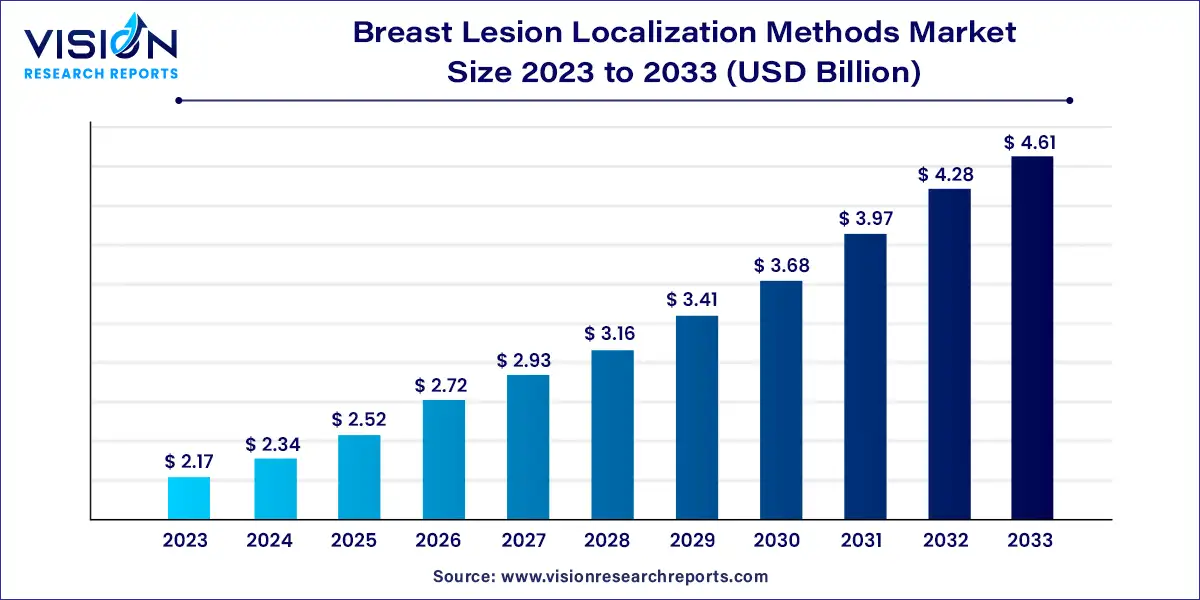The global breast lesion localization methods market size was estimated at around USD 2.17 billion in 2023 and it is projected to hit around USD 4.61 billion by 2033, growing at a CAGR of 7.83% from 2024 to 2033.

Key Highlights:
- North America dominated the market with the largest market share of 36% in 2023.
- By Type, the wire-guided localization (WGL) segment captured the maximum market share of 34% in 2023.
Breast lesion localization methods are techniques used to precisely locate lesions within the breast tissue for diagnostic and therapeutic purposes. These methods are crucial in guiding surgeons during procedures such as lumpectomy or biopsy. The market for these localization methods includes various technologies, including imaging techniques, localization devices, and emerging innovations.
Get Sample@ https://www.visionresearchreports.com/report/sample/41529
Key Drivers of Market Growth
- Rising Incidence of Breast Cancer
The increasing prevalence of breast cancer globally is a significant driver of market growth. According to the World Health Organization (WHO), breast cancer is the most common cancer among women, leading to a higher demand for accurate localization methods to improve treatment outcomes.
- Technological Advancements
Innovations in imaging and localization technologies have enhanced the accuracy and efficiency of breast lesion localization. Techniques such as radiofrequency identification, magnetic resonance imaging (MRI), and ultrasound-guided localization have revolutionized the field, driving market growth.
- Increasing Awareness and Screening Programs
Growing awareness about breast cancer and the importance of early detection has led to an increase in screening programs and preventive measures. This trend is contributing to the demand for advanced localization methods.
- Government Initiatives and Funding
Governments and healthcare organizations are investing in breast cancer research and funding initiatives to improve diagnostic and treatment options. These investments support the development and adoption of advanced localization techniques.
Market Segmentation
The breast lesion localization methods market can be segmented based on technology, application, end-user, and region.
By Technology
- Imaging Techniques
- Mammography: A standard imaging technique used for initial breast cancer screening. Digital mammography provides high-resolution images to detect abnormalities.
- Ultrasound: Often used in conjunction with mammography, ultrasound helps to differentiate between solid and cystic lesions and guides biopsy procedures.
- MRI: Provides detailed images of breast tissue and is used for complex cases where other imaging methods are inconclusive.
- Localization Devices
- Wire Localization: A traditional method involving the placement of a thin wire into the breast tissue to guide the surgeon during excision.
- Radioactive Seed Localization: Uses a small radioactive seed to mark the lesion, which is detected by a gamma probe during surgery.
- Magnetic Marker Localization: Utilizes a magnetic marker placed near the lesion, which can be detected using a magnetic probe.
- Emerging Technologies
- Laser Localization: A new technique that uses lasers for precise localization of lesions.
- Biodegradable Markers: Markers that degrade naturally over time, reducing the need for removal after surgery.
By Application
- Diagnostic Procedures
- Biopsy Guidance: Localization methods are used to guide biopsies, allowing for accurate sample collection from suspicious lesions.
- Pre-Surgical Planning: Techniques that help plan surgical approaches and ensure complete removal of lesions.
- Therapeutic Procedures
- Lumpectomy: Localization methods are critical for guiding the excision of breast lesions while preserving healthy tissue.
- Targeted Therapy: Advanced localization helps in delivering targeted treatments to specific areas of the breast.
By End-User
- Hospitals
- Diagnostic Imaging Centers
- Specialized Breast Clinics
- Research and Academic Institutions
Regional Analysis
- North America
North America holds the largest market share due to the high prevalence of breast cancer, advanced healthcare infrastructure, and significant investments in research and development. The U.S. and Canada are key contributors to market growth in this region.
- Europe
Europe is experiencing steady growth in the breast lesion localization methods market, driven by increasing awareness and government initiatives. Countries such as Germany, the UK, and France are major markets in this region.
- Asia-Pacific
The Asia-Pacific region is expected to witness significant growth due to the rising incidence of breast cancer, improving healthcare infrastructure, and increasing healthcare expenditure. China, India, and Japan are prominent markets in this region.
- Latin America
Latin America is experiencing gradual market growth, supported by increasing healthcare access and rising awareness about breast cancer. Brazil and Mexico are key markets in this region.
- Middle East and Africa
The Middle East and Africa are emerging markets with growth potential driven by increasing healthcare investments and awareness campaigns. South Africa and the UAE are key markets in this region.
Read More@ https://www.heathcareinsights.com/androgenetic-alopecia-market-overview/
Top Manufactures in Breast Lesion Localization Methods Market
- BD
- SOMATEX Medical Technologies GmbH
- Argon Medical Devices
- Merit Medical Systems
- Cook Medical
- STERYLAB S.r.l.
- Theragenics Corporation
- MDL SRL
- MOLLI Surgical
Challenges and Restraints
- High Cost of Advanced Technologies
The high cost of advanced localization devices and imaging technologies can limit their accessibility, particularly in developing regions.
- Regulatory Challenges
Stringent regulatory requirements and the need for extensive clinical trials can delay the approval and adoption of new localization technologies.
- Technical Limitations
Some localization methods may have limitations in terms of accuracy or invasiveness, affecting their effectiveness in certain cases.
Future Outlook
The breast lesion localization methods market is poised for continued growth, driven by technological advancements, increasing awareness, and rising healthcare investments. Emerging technologies such as laser localization and biodegradable markers are expected to further enhance the accuracy and convenience of localization procedures. The focus on personalized medicine and targeted therapies will also contribute to the demand for innovative localization solutions.
Buy this Premium Research Report@ https://www.visionresearchreports.com/report/checkout/41529
You can place an order or ask any questions, please feel free to contact sales@visionresearchreports.com| +1 650-460-3308
